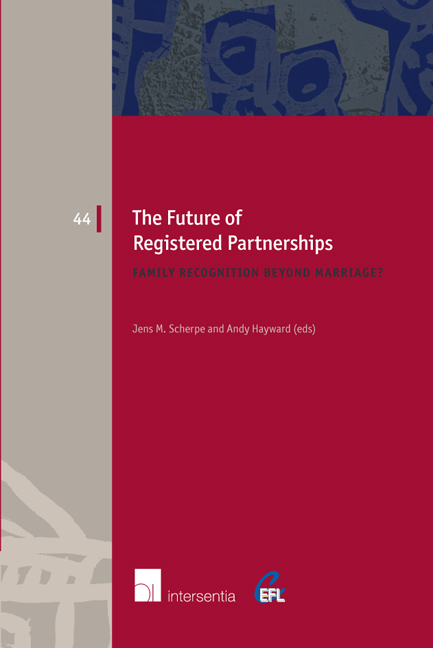Book contents
- Frontmatter
- Foreword
- Preface
- Contents
- List of Contributors
- The Future of Registered Partnerships: An Introduction
- Questionnaire
- Part I Registered Partnerships as a Functional Equivalent to Marriage
- Part II Registered Partnerships as an Alternative to Marriage
- Part III Registered Partnerships in a Time of Transition
- Registered Partnerships in England and Wales
- Registered Partnerships in Scotland
- Registered Partnerships in Northern Ireland
- Registered Partnerships in the Republic of Ireland
- Registered Partnerships in Greece and Cyprus
- Part IV Alternative Models for Registered Partnerships: Beyond Conjugality, Beyond Formality
- Part V Registered Partnerships, Discrimination and Human Rights
- Part VI Comparative Perspective and Conclusions
- Index
- European Family Law Series
Registered Partnerships in Greece and Cyprus
from Part III - Registered Partnerships in a Time of Transition
Published online by Cambridge University Press: 22 September 2018
- Frontmatter
- Foreword
- Preface
- Contents
- List of Contributors
- The Future of Registered Partnerships: An Introduction
- Questionnaire
- Part I Registered Partnerships as a Functional Equivalent to Marriage
- Part II Registered Partnerships as an Alternative to Marriage
- Part III Registered Partnerships in a Time of Transition
- Registered Partnerships in England and Wales
- Registered Partnerships in Scotland
- Registered Partnerships in Northern Ireland
- Registered Partnerships in the Republic of Ireland
- Registered Partnerships in Greece and Cyprus
- Part IV Alternative Models for Registered Partnerships: Beyond Conjugality, Beyond Formality
- Part V Registered Partnerships, Discrimination and Human Rights
- Part VI Comparative Perspective and Conclusions
- Index
- European Family Law Series
Summary
GREECE
HISTORY AND BACKGROUND
BASIC STRUCTURES OF THE LAW ON ADULT RELATIONSHIPS
Marriage
In Greece, up until 2008 the only option available in order to formalise an adult relationship was marriage. Only open to opposite-sex couples, marriage is regulated in the 4th book of the Civil Code, which contains chapters on – in this order – betrothal (largely inactive nowadays), marriage and its formal requirements, the spousal relationship (personal and financial aspects), divorce, medically assisted human reproduction, kinship, maintenance, parent – child relationships, adoption, child trusteeship and child fostering, judicial interdiction and judicial custody of property (these last two not relevant to marital relationships).
These provisions reveal the deep interest attached to marriage within Greek society, evident mainly through what is called the ‘mandatory’ nature of the vast majority of these provisions, meaning that marriage constitutes in most respects a take-it-or-leave-it package of legal consequences and it is not possible for it to be tailored according to the will of the parties. An exception is the property regime, where the default position is that each spouse retains their separate property, while once the marriage is dissolved the parties may put forward a claim of co-ownership for those assets acquired during the marriage to which they can prove they financially contributed (apoktemata). Apart from this default regime, spouses may opt for a system of complete co-ownership, the specifics of which are to be elaborated in an agreement between them.
At the same time, family law as a whole remains flexible by introducing various ‘general notions’, e.g. an ‘important reason’ (to ascertain whether indeed the spousal relationship has been compromised and thus open up the way to non-consensual divorce), ‘marital cohabitation’ (an obligation owed by both parties to each other, failure to fulfil which gives grounds for divorce), the ‘interest of the child’, etc., allowing the judge to adapt to the continuously changing social perceptions of such notions and deliver the most fair, balanced and also most contemporary judgment.
Family law in Greece underwent a major reform in 1983.
- Type
- Chapter
- Information
- The Future of Registered PartnershipsFamily Recognition Beyond Marriage?, pp. 301 - 346Publisher: IntersentiaPrint publication year: 2017

